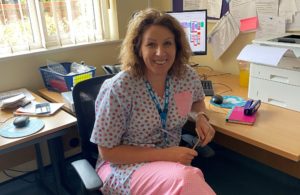As a qualified paramedic, the non-medical prescribing (NMP) programme has enabled Lyn to take on additional responsibilities in assessing and prescribing medication for patients within her role. Extending prescribing responsibilities to paramedics and other qualified healthcare professionals has benefits for both the NHS and service users, such as making better use of healthcare professionals’ skills and providing more timely access to medicines and care for patients.
 Lyn started her career in 2006 working on the frontline in ambulances and emergency response vehicles. She then moved to an Emergency Operations Centre, where she worked as a Clinical Manager overseeing a team of nurses and paramedics responsible for triaging 999 calls, as well as providing advice and guidance for both patients awaiting ambulances and staff on scene needing clinical support.
Lyn started her career in 2006 working on the frontline in ambulances and emergency response vehicles. She then moved to an Emergency Operations Centre, where she worked as a Clinical Manager overseeing a team of nurses and paramedics responsible for triaging 999 calls, as well as providing advice and guidance for both patients awaiting ambulances and staff on scene needing clinical support.
In 2018, a few years after completing her Masters in Paramedic Science, Lyn moved into primary care. Lyn says, “I found myself on a steep learning curve into both minor illness and long-term conditions.”
“My current role is as an Urgent Care Practitioner in a rural GP Surgery with a patient population of just under 17,000. There are two of us, and between us we are responsible for home visits, twice-weekly visits to care homes, and the running of minor injury and illness clinics.”
“For a long time, I had hoped that the paramedic profession would open up to allow us to prescribe.”
A year later in 2019, this became a reality when legislation was changed to allow paramedics to take on additional prescribing responsibilities after undertaking suitable training. Shortly after, Lyn enrolled on the OU’s new Postgraduate Certificate in Non-Medical Prescribing.
The OU’s NMP programme, which is delivered in partnership with employers through a combination of supported distance learning and practice-based learning within the workplace, provided the flexibility that Lyn needed to fit study around her work and other commitments.
“I chose to study with the OU primarily because the nature of the course suited both myself and my employer. I felt it would be a more attractive proposition to them than some of the local university programmes that required weekly attendance.”
“The format of the course required me to attend campus days on minimal occasions, reducing the impact of studying on my work. The study materials were well structured and thought out, and the web-based learning was easy to navigate.”
Having successfully completed the Postgraduate Certificate in Non-Medical Prescribing, Lyn is now eligible to register as in independent prescriber with her professional regulator, the Health and Care Professions Council. This will enable Lyn to make the best use of her skills and expertise, while improving care for service users.
“Studying the course has made a huge difference to the way that I work. It has encouraged me to think more deeply about disease presentation, about medication interaction, and about the wider factors involved in prescribing. My employers have been very pleased with the results of the course and the amount that I have learnt in a relatively short space of time.”
Find out more about the OU’s Postgraduate Certificate in Non-Medical Prescribing.
 Lauren Robinson is part of the Strategic External Engagement Team within the Faculty of Wellbeing, Education and Language Studies at the OU. Specialising in B2B communications management, she is responsible for employer and partner communications within the Faculty. Lauren has completed her Bachelor of Laws (Hons) with the OU and is currently studying towards her MBA. She is a keen reader and enjoys travel and cooking.
Lauren Robinson is part of the Strategic External Engagement Team within the Faculty of Wellbeing, Education and Language Studies at the OU. Specialising in B2B communications management, she is responsible for employer and partner communications within the Faculty. Lauren has completed her Bachelor of Laws (Hons) with the OU and is currently studying towards her MBA. She is a keen reader and enjoys travel and cooking.



